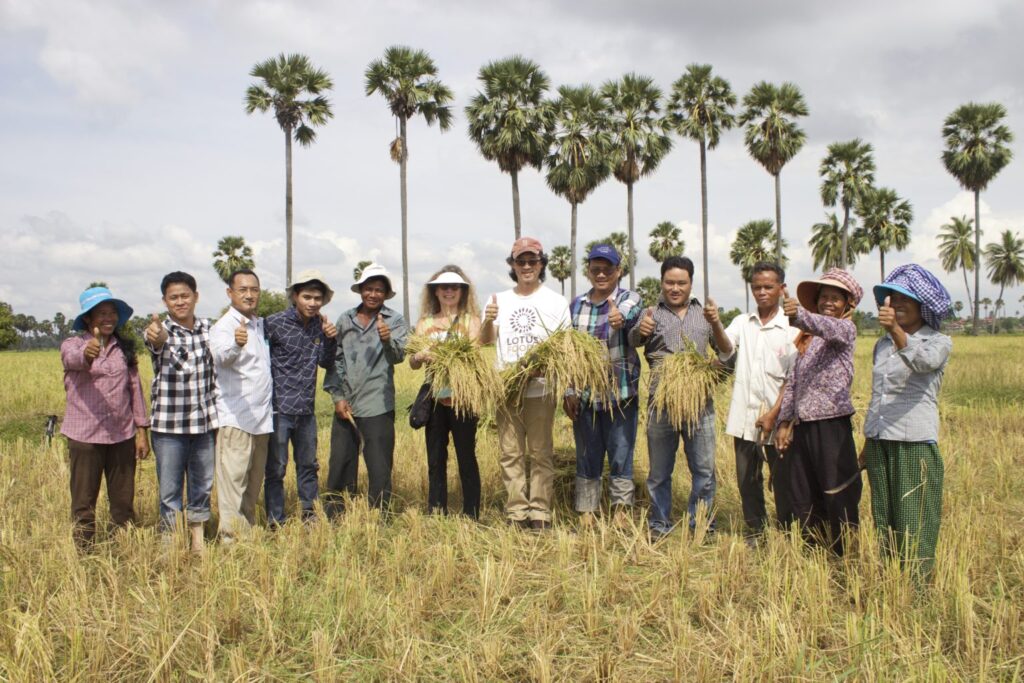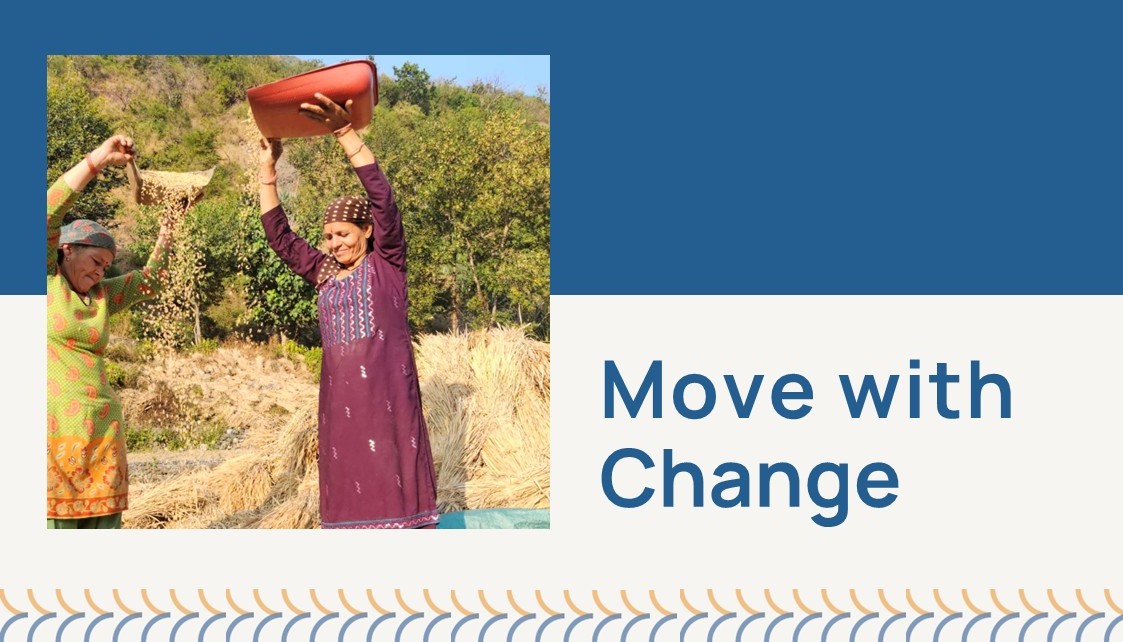Lotus Foods was in the middle of negotiating a loan increase with RSF Social Finance when the organic and heirloom rice and ramen noodle importer suddenly experienced supply chain issues. Shipping container space from Asia to the West Coast was scarce, and when the Lotus Foods team could book containers, they found the costs had jumped up to 600%.
Business had boomed for Lotus Foods during the pandemic, but leaders at the Richmond, California–based company realized that if they wanted to continue meeting that demand, they’d need to increase their inventory by ordering goods earlier than their normal lead time—which meant they also needed more working capital.
Their original request had gone to RSF’s loan committee for approval when Caryl Levine and Ken Lee, Lotus Foods’ co-founders and co-CEOs, along with Andrew Burke, president and chief operating officer, called RSF to ask for adjusted terms. They reached out on a Thursday. RSF, understanding the urgency of Lotus Foods’ position, acted quickly to change the agreement. The revised loan—with covenant relief and other concessions—was finalized on Wednesday the following week.
It was just one example of how RSF has supported Lotus Foods in overcoming challenges as the business expands its mission to cultivate rice in a sustainable way and support smallholder farmers. “There are always going to be great times and bad times in business,” says Levine. “But what we love about RSF is that when we have a bump in the road, we know we can survive because we’ve got a great foundation that RSF respects and values. They help us to make better business decisions that always enable us get through those bumps.”
Starting a mission—and a company—on a shoestring
Levine and Lee were a young couple in Connecticut (they’re now married) when they dreamed of starting their own business. She worked in development at the University of Hartford. He was a financial planner. In 1993, after Levine accepted a job at the University of California, they traveled to China to look for opportunities.
While there, they ate steaming bowls of black rice and fell in love with it. They learned that it was called longevity rice and was so prized for its health benefits that it had once been reserved for China’s emperors. After touring the Forbidden City, home of the emperors, Lee arrived at the name, Forbidden Rice, which they trademarked.
They knew it wouldn’t be easy to sell this new kind of grain to Americans, who were familiar only with starchy white rice. In a clever marketing strategy, they approached top chefs around the country, including Gary Danko and Alice Waters, to cultivate interest. In 1995, they launched Lotus Foods, selling organic, fair trade certified, non-GMO rice.
They kept the company afloat by relying on Levine’s income and maxing out dozens of zero-interest credit cards. “We self-funded the company,” Levine says. “We would buy a ton of rice, sell it for a 50% margin and then buy two tons more.”
Now the Certified B Corporation is one of the largest providers of heirloom and organic rice and rice ramen in the country. It sells its products through major retailers such as Whole Foods, Costco, Walmart, Wegmans and Publix.
Focusing on sustainability through More Crop Per Drop™
Lotus Foods’ mission, from the beginning, was to preserve heirloom rice varieties and help smallholder farmers grow crops in a sustainable way. That vision became more achievable in 2005, after Levine and Lee learned about the System of Rice Intensification through Cornell University’s International Institute for Food Agriculture and Development. SRI is an innovative approach to rice farming that uses 50% less water and 90% less seed while producing two to three times more rice.
SRI also produces 40% less methane, which means it could significantly reduce rice growing’s climate change impact. In his 2017 book Drawdown: The Most Comprehensive Plan Ever Proposed to Reverse Global Warming, Paul Hawken called SRI one of the top 100 solutions for reversing global warming by 2050.
Lotus Foods imported its first SRI-grown rice from Cambodia, Indonesia, and Madagascar in 2009 after meeting the farmers who were pioneering this agroecological methodology. In 2010, the company trademarked the name it gave the method, More Crop Per Drop™.

Weathering challenges and continuing to grow
Like many companies, Lotus Foods struggled after the global recession hit in 2008. Cash-strapped customers cut their food budgets and organic heirloom rice became a luxury, not a staple. As profits dropped, Lotus Foods’ bank introduced the co-founders to RSF, which had more flexibility and was able to both transition the line of credit and provide long-term debt to refinance subordinated debt.
Levine and Lee met with RSF in 2013, and the connection was immediate. “One of the things that impressed us about Lotus Foods was the way in which they were founded and built,” says Mindy Christensen, RSF’s vice president of lending. “The mission always came first for them, which is something we value.”
RSF issued Lotus Foods a $400,000 line of credit in 2014 for working capital, an amount that grew over the years. Four years later, Lotus Foods refinanced $1.3 million of subordinated debt with RSF. In 2020, RSF increased the company’s credit line from $3 million to $4 million, and then added another $2 million this year.
Throughout this time, RSF helped Lotus Foods weather a series of challenges, including a packaging recall and a dramatic tariff increase on goods from China (where many of Lotus Foods’ valued-added rice products are manufactured) due to the trade war.
“We could probably get a more competitive interest rate for a line of credit elsewhere,” says Lee, “but we wouldn’t get a source of money that understands what we’re trying to do and stands behind us. It really matters who you take money from.”
Staying true to the mission and expanding it
Lotus Foods has been able to grow at a comfortable pace with limited outside investment because of its relationship with RSF. Lee and Levine transitioned out of daily operations with the hiring of Burke, their first C-suite executive, who started in October 2019. They are now focused on their bigger mission: to promote rice farming practices that simultaneously mitigate climate change, promote farmers’ resilience, and empower women. Inspired by social entrepreneur Konda Mason, they recently began working with Black farmers in Louisiana, Mississippi, South Carolina, Georgia, and Missouri who have started to experiment with growing rice using SRI farming methods.
“Lotus Foods would not be the business we are today or have the impact we have on smallholder farmers without our partnership with RSF,” says Levine. “They know us so well and help us make better decisions. RSF is perhaps our most critical business partner.”


